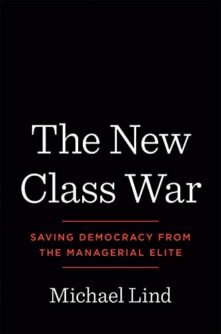
Numerous books, reports, and essays have examined the populist wave in this country and Europe during the past year. They have dissected this phenomenon from many different perspectives, ultimately seeking to arrive at some conclusions about how we got to where we are and what all this portends for the future. All in all, every one is aimed at determining the impact of change on the West’s culture, politics, and economics.
Two of the more-interesting recent contributions to the growing bibliography are Michael Lind’s book The New Class War: Saving Democracy from the Managerial Elite, a philanthropic aspect of which was covered in The Giving Review several weeks ago, and Thomas Geoghegan’s essay in the January-February New Republic, “Educated Fools: Why Democratic Leaders Still Misunderstand the Politics of Social Class.”
Lind’s book is part of what we’ve described as a “serious syllabus of sorts [that] is now finally forming for the coming clarification of conservatism.” It analyzes the conflict that has erupted between the dominant group in Western democracies, the university-educated managerial professional class, and the high-school-educated working class, regardless of race and national origin.
In it, Lind seeks to understand and explain the defensive populist reaction against the technocratic revolution that has enlarged, enriched, and empowered the managerial elites during the last half century. He argues that the neoliberal revolution has weakened the intermediate institutions that sustain our democratic pluralism—trade unions, churches, other religious organizations, and mass-membership parties at the local level.
Similarly, but somewhat more narrowly, Geoghegan’s essay focuses on the deepening divisions developing between the Democratic Party and its allied elites, and what he calls our “high school nation.” He explains how the educated class has mismanaged cultural, economic, and political change in such a way as to undermine bonds of fraternity and substantially diminish opportunities to foster solidarity.
“How many of us in the party’s new postgraduate leadership caste,” Geoghegan asks,
have even a single friendship, a real one, of two equals, with any man or woman who is just a high school graduate? …
[I]t’s unthinkable that the college-educated base of the party would trust a high school graduate without a four-year degree to run for or hold a serious office. We don’t trust them, and would never vote for one of them. Why should they trust or vote for one of us?”
Beginning his harsh critique of the caste’s relationship with their fellow citizens, Geoghegan writes, “For those of us cut off from the white working class, it is easy to think the answer to inequality is: Imitate us.” (Italics in original.)
Geoghegan draws his essay to a close by citing the interpretation of Walt Whitman’s “Leaves of Grass” by his Geoghegan’s college teacher and mentor, Sam Beer, on the critical nature of understanding one’s place in the cultural, economic, and political hierarchies of our democratic society. “[O]ut of the work of every class comes the common purpose of the nation,” Geoghegan writes—“the bonds of our political union.”
Philanthropists and philanthropy professionals, of whatever worldview, who are considering that which they can and should do to address the cultural, economic, and political changes in our society must also realize that it’s quite insufficient to merely say the equivalent of “imitate us” to those currently dismissing or questioning their legitimacy, directly or indirectly. “Imitate” our educational credentials, our professional standing, the size of our bank accounts, the inventory list of our properties? That would essentially be a feudal mentality in a world no longer feudal.
What then to say? Where then to look?
Discussing The New Class War with The American Interest’s Aaron Sibarium as part of the “TAI Conversations” series, Lind recently referred to sociologist Will Herberg’s work. Following Herberg, Lind proposes, we have to consider going back to some kind of “institutionalized representation” in our public lives. We need to get back the elastic, though Lind doesn’t use that term, which used to be so present in daily life. More elasticity in the institutions that govern our daily lives would better nurture “value pluralism”—a term Lind does use, in the book and the TAI conversation. Institutional elasticity would allow for us all to live and let live, to co-exist with each other.
To those aware of the important role grantmakers can play in sparking ideas, sustaining tradition, and supporting a society of ordered liberty, Lind’s references in the book and the TAI conversation to the tribunes of ancient Rome—the role of which was to represent the ordinary people against the senatorial class—are insightful and instructive.
Responding to a question from Sibarium on today’s democratic deficits, Lind recalls the institutionally elastic tribunes’ decline and the lessons to be learned from that decline.
[T]he moment it was reduced to one tribune—who happened to be Caesar—that was the end of that system. So you have to have lots of little petty tribunes, lots of petty power brokers, whom the metropolitan liberals never liked. The elite conservatives never liked them. Everybody looked down their noses at them, and at the church ladies, and at the corrupt local union boss, but they’re all gone now. They’re all extinct, just like the dinosaurs. So there’s this huge void in between. Nothing’s perfect, but I think we do have to rebuild this group of intermediate brokers so that you don’t simply have a political system that consists of donors, advertising experts, and policy wonks who live in New York and Washington and maybe San Francisco.
Givers would do well to think carefully along Lind’s lines about tribunes—which is consistent with Geoghegan’s Beer-informed interpretation of Whitman—and about all of their concern for how best to strengthen the bonds of our union. It’s a good place to start looking.